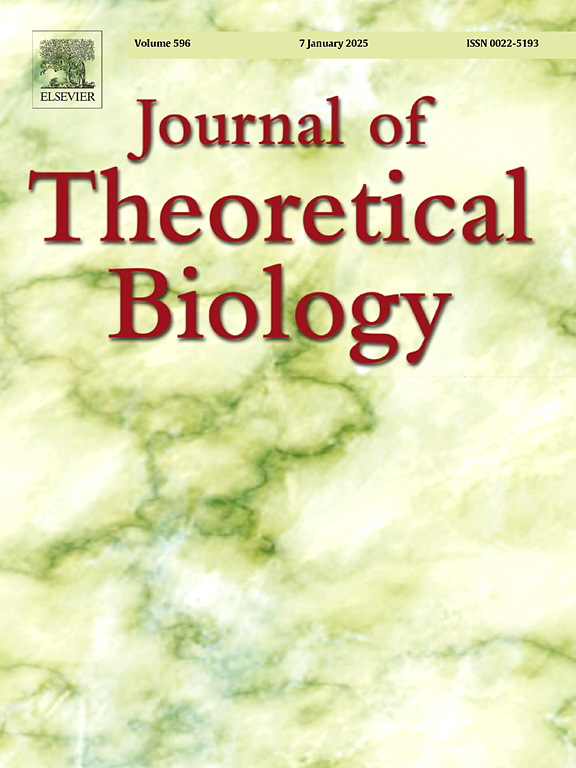Accurate stochastic simulation algorithm for multiscale models of infectious diseases
IF 1.9
4区 数学
Q2 BIOLOGY
引用次数: 0
Abstract
In the infectious disease literature, significant effort has been devoted to studying dynamics at a single scale. For example, compartmental models describing population-level dynamics are often formulated using differential equations. In cases where small numbers or noise play a crucial role, these differential equations are replaced with memoryless Markovian models, where discrete individuals can be members of a compartment and transition stochastically. Classic stochastic simulation algorithms, such as the next reaction method, can be employed to solve these Markovian models exactly. The intricate coupling between models at different scales underscores the importance of multiscale modelling in infectious diseases. However, several computational challenges arise when the multiscale model becomes non-Markovian. In this paper, we address these challenges by developing a novel exact stochastic simulation algorithm. We apply it to a showcase multiscale system where all individuals share the same deterministic within-host model while the population-level dynamics are governed by a stochastic formulation. We demonstrate that as long as the within-host information is harvested at a reasonable resolution, the novel algorithm will always be accurate. Furthermore, our implementation is still efficient even at finer resolutions. Beyond infectious disease modelling, the algorithm is widely applicable to other multiscale systems, providing a versatile, accurate, and computationally efficient framework.
传染病多尺度模型的精确随机模拟算法。
在传染病文献中,对单一尺度的动力学研究投入了大量的精力。例如,描述种群水平动态的隔间模型通常使用微分方程来表述。在小数字或噪声起关键作用的情况下,这些微分方程被无记忆马尔可夫模型所取代,其中离散个体可以是一个隔间的成员,并且随机过渡。经典的随机模拟算法,如下一反应法,可以用来精确地求解这些马尔可夫模型。不同尺度模型之间的复杂耦合强调了传染病多尺度建模的重要性。然而,当多尺度模型变为非马尔可夫模型时,会出现一些计算挑战。在本文中,我们通过开发一种新颖的精确随机模拟算法来解决这些挑战。我们将其应用于展示多尺度系统,其中所有个体共享相同的确定性宿主内模型,而种群水平的动态由随机公式控制。我们证明,只要以合理的分辨率获取主机内信息,新算法将始终是准确的。此外,即使在更精细的分辨率下,我们的实现仍然有效。除了传染病建模之外,该算法还广泛适用于其他多尺度系统,提供了一个通用、准确和计算效率高的框架。
本文章由计算机程序翻译,如有差异,请以英文原文为准。
求助全文
约1分钟内获得全文
求助全文
来源期刊
CiteScore
4.20
自引率
5.00%
发文量
218
审稿时长
51 days
期刊介绍:
The Journal of Theoretical Biology is the leading forum for theoretical perspectives that give insight into biological processes. It covers a very wide range of topics and is of interest to biologists in many areas of research, including:
• Brain and Neuroscience
• Cancer Growth and Treatment
• Cell Biology
• Developmental Biology
• Ecology
• Evolution
• Immunology,
• Infectious and non-infectious Diseases,
• Mathematical, Computational, Biophysical and Statistical Modeling
• Microbiology, Molecular Biology, and Biochemistry
• Networks and Complex Systems
• Physiology
• Pharmacodynamics
• Animal Behavior and Game Theory
Acceptable papers are those that bear significant importance on the biology per se being presented, and not on the mathematical analysis. Papers that include some data or experimental material bearing on theory will be considered, including those that contain comparative study, statistical data analysis, mathematical proof, computer simulations, experiments, field observations, or even philosophical arguments, which are all methods to support or reject theoretical ideas. However, there should be a concerted effort to make papers intelligible to biologists in the chosen field.

 求助内容:
求助内容: 应助结果提醒方式:
应助结果提醒方式:


